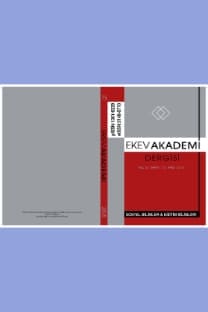ALGININ FENOMENOLOJİSİ’NDE BEDEN VE DÜNYANIN ALGISAL DENEYİMDEKİ BİRLİĞİ
Ponty’nin beden felsefesi, empirizm ve idealizmin beden, bilinç, dünya ve bunlar arasındaki ilişkiye yönelik düşüncesine bir alternatif sunar. Ponty geleneksel metafiziğin düalist ve mekanik beden anlayışlarını yapısöküme uğratarak, kendi fenomenolojik yaşam bedeni düşüncesini geliştirir ve birbirine zıt ama aynı zamanda birbirini zorunlu olarak içeren bu düalist yapıyı, algısal deneyimde beden-özne anlayışıyla aşmaya çalışır. Bedenin dünyayla etkileşimi, zihinsel durumları ve edimleri oluşturduğu için, bilinç kendi çevresinden ayrı düşünülemez. Ponty’de beden, salt bir nesne değil, bir öznedir, bir bilinç formudur. Bu anlamda bedensel bilinç, tüm zihinsel durumlar ve edimlerin dayanağına dönüşür. Ponty bedensel bilince dayalı öznellik anlayışını, algı ve eyleme ilişkin derinlikli araştırmasıyla ortaya koymaya çalışır. Beden, ne dünya içinde diğer nesneler gibi bir nesnedir ne de bilinçten bağımsız bir varoluşa sahiptir. Ponty’de birey, kendinin bedenidir. Beden-öznenin bedensel varoluşu onun dünyaya yönelimsel açılımını olanaklı kılar. Bu açıdan Ponty’nin Algının Fenomenolojisi’nde betimlediği beden felsefesi aslında bireysel varoluşa ilişkin bir sorgulamadır. Algısal, bedensel bir düzeyde, düşünüme öncel bir varoluş durumunda bilinç ve dünyanın karşılıklı ilksel etkileşimi, belirsiz mevcudiyet üzerinde fenomenlerin görünür olmasını ve anlam olanaklarının sınırsız ufkunun açılmasını mümkün kılar. Düşünüme, yargıya ve anlama öncel olan beden ve dünyanın her an yinelenen bu ilksel teması, fenomenal alanı açan yaratıcı bir eylemselliktir. Bu makalenin amacı Ponty’nin kendi beden analizinde insan varoluşunun dünyadalığını ve algıda kendini beden olarak duyumsayan bireyin yönelimselliğini hareket, motor beceri, alışkanlık, cinsellik ve beden-şema kavramları aracılığıyla nasıl açımladığını ve böylece insani varoluşun olanağını, dünyayla düşünüm-öncesi etkileşime nasıl dayandırdığını açıklamaktır. Bu bedensel varoluş tarzı, algının ve dünyanın belirsiz ufkunda, birbiriyle bağlantılı sınırsız ilişkiler ağını açar ve her türden nesnel hakikat iddialarını geçersiz kılar.
Unity of Body and World in Perceptual Experience in the Phenomenology of Perception
Ponty’s philosophy of the body offers an alternative to empiricism and idealism’s thinking about the body, consciousness, the world and the relationship betweenthem. By deconstructing the düalist and mechanical body understandings of traditional metaphysics, Ponty develops his own phenomenological life-body idea and tries to overcome this düalist structure, which is opposite to each other but also necessarily includes each other, with the body-subject understanding in perceptual experience. Consciousness cannot be separated from its environment, as the body’s interaction with the world constitutes mental states and actions. In Ponty, the body is not a mere object but a Subject , a form of conciousness. In this sense, bodily consciousness become the basis of all mental states and actions. Ponty tries to reveal his understanding of subjectivity based on bodily consciousness through his in-depth research on perception and action. The body is neither an object in the world like other objects, nor does it have an existence independent of consciousness. In Ponty, the individual is his own body. The body makes possible the intentional opening of the body-subject to the World. In this respect, the body philosophy that Ponty describes in his Phenomenology of Percepton is actually a questioning of individual existence. On a perceptual, bodily level, in a state of existence prior to reflection, the reciprocal primal interaction of consciousness and the world makes it possible for phenomena to be visible on indefinite existence and to open up unlimited horizons of meaning possibilities. This primordial contact of the body and the world, which is prior to reflection, judgement and understanding, is a creative activism that opens the phenomenal field. The aim of this article is to explain how Ponty, in his body analysis, explains human worldliness and the intentionality of the individual who perceives himself as a body through the concepts of movement, motor skill, habit, sexuality and body-schema, and thus how he bases the possibility of human existence on pre-reflective interaction with the world. This bodily mode ofexistence opens up the boundless web of interconnected relations on the indefinite horizon of perception and the world and invalidates all kinds of objective truth claims.
___
- Aras, K. (2017). Modern sinemanın olanağı olarak ‘yeni bir dünya imgesi’. Felsefe Dünyası Dergisi, 66 (Kış), 96-130.
- Aras, K. (2018). Aşkın bir felsefe karşısında içkin bir felsefe. A. Tüzer & A. Utku (Eds), Sorgulanan felsefe içinde (ss.135-160). Elis.
- Barral, M. R. (1969). Merleau Ponty on the body. Southern Journal of Philosophy (Summer), 171-179. https://doi.org/10.1111/j.2041-6962.1969.tb02051.x
- Canas, P. M. (2019). The Understanding of the body and movement in merleau ponty. Trans/Form/Acao, 42 (1), 201-226. http://dx.doi.org/10.1590/0101-3173.2019
- Carman, T. (2008). Merleau-Ponty. Routledge.
- Halak, J. (2018). The concept of ‘body schema’ in Merleau-Ponty’s account of embodied subjectivity. In B. Andrieu, J. Parry, A. Porrovecchio, & O. Sirost (Eds.), Body ecology and emersive leisure (pp.37-50). Routledge.
- Husserl, E. (2000). Ideas pertaining to a pure phenomenology and to a phenomenological philosophy. Second book: Studies in the phenomenology of constitution (5. baskı). Kluwer Academic.
- Husserl, E. (1982). Cartesian meditations. An ıntroduction to phenomenology (70. baskı). Martinus Nijhoff.
- Husserl, E. (1970). The crisis of european sciences and transcendental phenomenology. An ıntroduction to phenomenological philosophy. Northwestern University.
- Keat, R. (1982). Merleau-Ponty and the phenomenology of the body. https://www.russellkeat.net/admin/papers/ ,1-16.
- Malighetti, R. (2005). Merleau-Ponty’s concept of the body. I Quaderni del Cream, IV, 147-160. https://www.academia.edu/38095749/
- Morris, D. (2008). Body. In R. Diprose, & J. Reynolds (Eds.), Merleau ponty: Key concepts (pp. 111-120). Routledge.
- Ponty, M, M. (2020). Algının fenomenolojisi (2. baskı). (Çev. E. Sarıkartal, & E. Hacımuratoğlu). İthaki.
- Ponty, M, M. (1964). The primacy of perception. Northwestern University.
- Ponty, M. M. (1967). The structure of behavior (Çev. Alden L. Fisher). Beacon.
- Priest S. (2003). Merleau-Ponty. Routledge.
- Romdenh-Romluc, K. (2010). Routledge philosophy guidebook to: merleau-ponty and phenomenology of perception. Routledge.
- Suhendra, H. J. (2023). Perception as body: body as perception. a reflection on the phenomenology and of perception of Maurice Merleau Ponty. https://www.academia.edu/7212648/Perception_as_Body_Body_as_Perception_Reading_Merleau_Ponty’s_Phenomenology_of_Perception, 1-17. (Erişim Tarihi: 07.06.2023)
- Wilkerson, W.(2013). Merleau Ponty the metaphysician: the living body as a plurality of forces. The journal of speculative philosophy, Special Issue With The Society For Phenomenology and Existential Philosophy, 27 (3), 297-307. https://www.jstor.org/stable/pdf/10.5325/jspecphil.27.3.0297
- Yıldırım, A., & Şimşek, H. (2018). Sosyal bilimlerde nitel araştırma yöntemleri (11. baskı). Seçkin.
